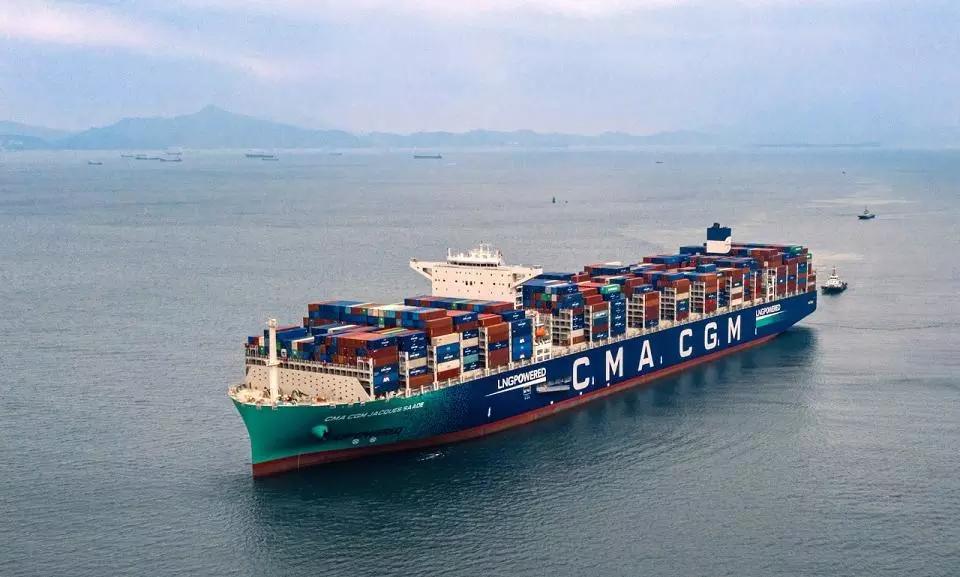CMA CGM creates $1.5 billion special fund for energies
Objective is to accelerate decarbonisation across shipping, inland, and logistics operations globally.

The CMA CGM Group announced the launch of a special fund for energies, backed by a five-year, $1.5 billion budget, to accelerate energy transition and achieve net-zero carbon by 2050.
The fund will invest to support the industrial production of new fuels as well as low-emission mobility solutions across the Group's business base (maritime, overland and air freight shipping; port and logistics services and offices), says an official statement.
Rodolphe Saadé, Chairman and CEO, CMA CGM Group
"The CMA CGM Group has been acting to protect the environment for many years," says Rodolphe Saadé, Chairman and CEO, CMA CGM Group. "It is at the heart of my convictions and of our strategy. However, in the face of the climate emergency, it is our duty to do more and accelerate our actions.
"This fund will enable us to make substantial investments in innovative projects to decarbonise our business. We have allocated the resources needed to accelerate our energy transition and that of the entire shipping and logistics industry."
The fund is structured around four lines of focus to develop tomorrow's energy and mobility solutions, the statement said.
First focus: Supporting the development and production of renewable fuels
The CMA CGM Group has already begun to respond to climate change by using liquefied natural gas (LNG) as a transitional maritime fuel.
"The fund has been tasked with (a) driving forward the emergence of industrial-scale production facilities for biofuels, biomethane, e-methane, carbon-free methanol, and other alternative fuels, and (b) increasing and securing volumes in line with Group needs, in partnership with other major industrial groups with expertise in these technologies, or with investment funds or promising start-ups."
The fund follows on from projects that have already been identified and launched, says the release. "The Salamander Project will produce 11,000 tonnes of second-generation biomethane per year starting in 2026. As part of the partnership with Engie, its target is to generate 200,000 tonnes of renewable gas per year by 2028 to serve the needs of CMA CGM and the entire shipping industry. A biomethane production and liquefaction project, developed with Titan, will produce up to 100,000 tonnes by 2025, with the possibility of doubling output by 2027. As a partner in the Jupiter 1000 project in Fos, the CMA CGM Group aims to continue working with the consortium on means to mass-produce low-carbon e-methane for its ships and provide solutions to the challenges of decarbonizing gas networks and managing the intermittent nature of certain renewables."
Second focus: Accelerating decarbonisation of port terminals, warehouses and truck fleets
The CMA CGM Group operates more than 700 warehouses and around 50 port terminals worldwide. It is committed to enabling these facilities to generate enough carbon-free electricity (wind, solar, biomass-fueled, hydrogen-fueled) to become energy self-sufficient.
"Port equipment in use will be electrified more quickly wherever feasible and effective. CEVA Logistics, a CMA CGM subsidiary, aims to meet all its electricity needs through carbon-free power generation by 2025. The subsidiary has plans to install 1.8 million sqm of photovoltaic panels and expand the use of LED lighting."
Third focus: Supporting, trialling and launching cutting edge projects
"In February 2020, the Group joined forces with Energy Observer to make hydrogen one of the energy sources of tomorrow. With the Energy Observer 2 project, the partners have taken a new step forward by working together on a prototype intra-regional container ship fueled by liquid hydrogen and designed to meet the latest technical and logistical standards."
The Group has also decided to acquire a stake in Neoline, a prototype sail-powered cargo ship set to serve transatlantic routes by the end of 2024.
Fourth focus: Pursuing energy savings and improving energy efficiency
The fourth focus has three main objectives including building energy management, encouraging and incentivising employee use of soft mobility solutions, and engaging 150,000 employees that rewards innovative environmental protection and energy efficiency initiatives.
The fund, starting in October 2022, wil be managed by a dedicated team bringing together some of the Group's most talented engineers, energy experts, financial analysts and project managers, the statement said.



